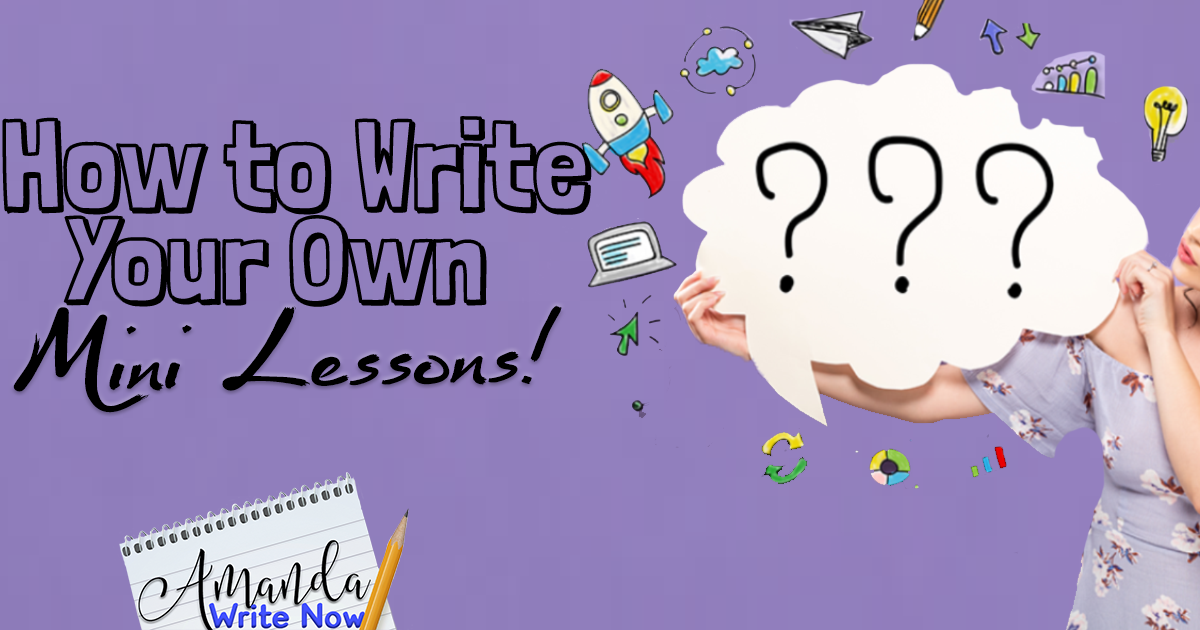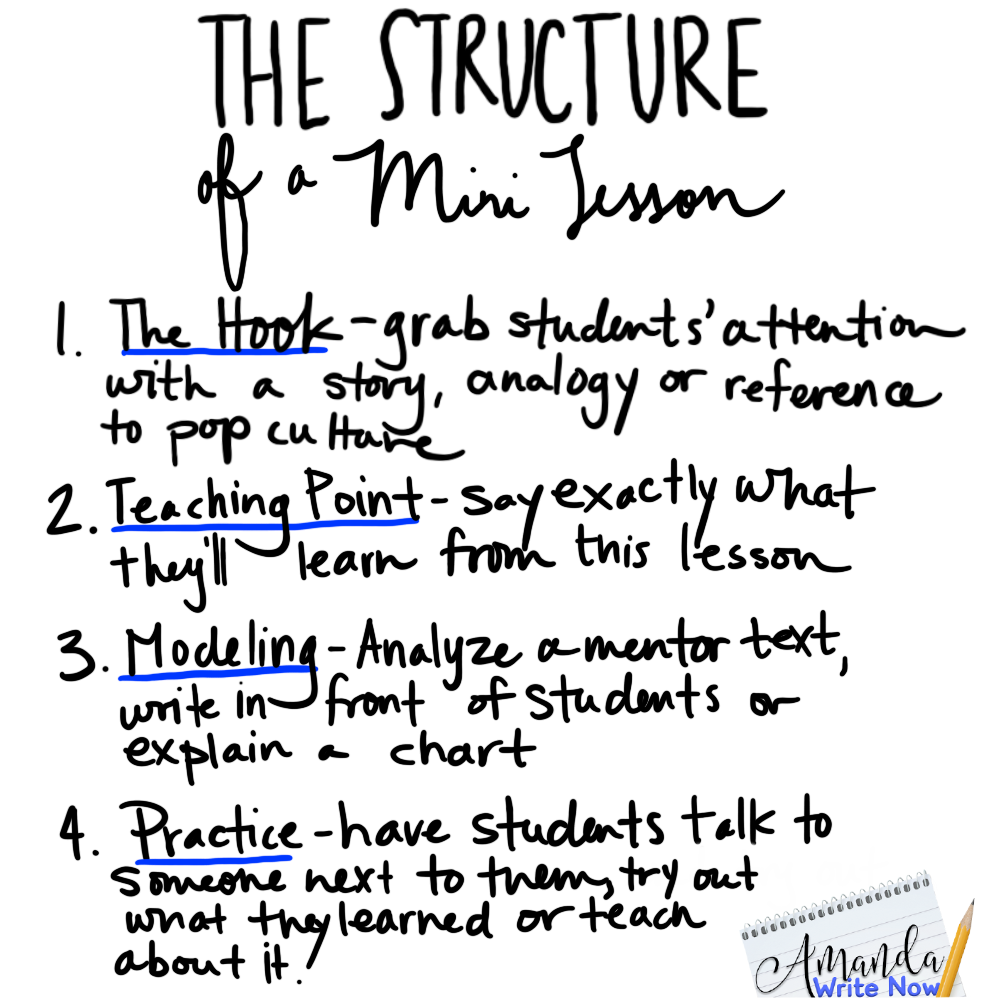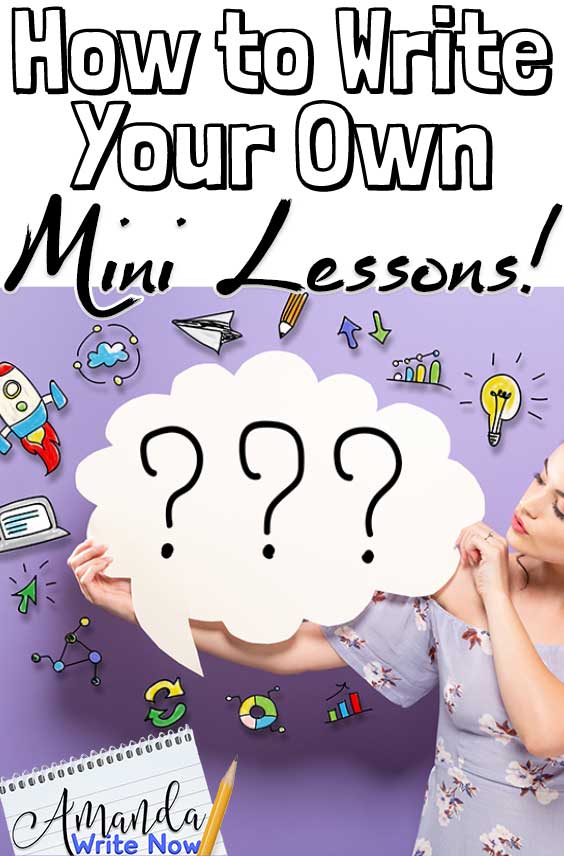
Teachers are busy and don’t have time to go looking for mini lessons. If you do have time, here are The Best Places to Find Mini Lessons Online. However, if you you don’t have time, like most teachers on planet Earth, then you’ll want to come up with your own mini lessons.
Now, I know that this article is titled “How to WRITE Your Own Mini Lessons” but I’m going to be completely honest and let you know I rarely actually write my mini lessons down. All I really do is write down is the skill I’m going to teach in my plan book and on the board, locate the appropriate materials depending on what I’m teaching and I’m ready. It’s that simple.
In the video below you are welcome to join me in my classroom to listen to how I plan mini lessons. Or just continue reading on!
Here’s a break down of the process I go through, and you can emulate, when planning mini lessons…
Decide on a Skill
First, pick a skill you notice most of your class is in need of. Here are big lists of skills/vocabulary terms for narrative, information and argumentative writing you can pick from.
Fill in the Structure
All of my mini lessons have the same structure. The chart below shows each component of a mini lesson. So let’s say you noticed a lot of your students struggle to use quotations properly in their writing. The rest of this article will go over how you would plan/write your own mini lesson teaching that skill.

Get a Hook
First, you’ll have to find a way to hook students into your lesson, but your lesson is about a pretty boring topic…using quotations properly.
My go to source for mini lesson hooks is pop culture.
Unless you are living under a rock, you’re probably already aware that students are really into Fortnite. So, I Googled the most popular Fortnite character and apparently it is “Crackshot”. Check out this video for more of the favorite “skins” in Fortnite. I also searched common popular expressions.
Now I can start my mini lesson by saying something like this, “Crackshot (you know from Fortnite) thinks using quotations properly in your writing is dank!” Dank means something really high quality. Okay, your students may laugh at you and you may even get the pop culture references wrong, but who cares at least you’ve gotten their attention and that’s the goal of a hook:)
Even a loose connection to a pop culture topic can get your kids leaning in ready to absorb your lesson. If the lesson relates to your life somehow that is also a great way to hook students in. Telling stories from your life is always fun. Analogies are another way to hook students. If you can compare the concept to something students are familiar with it can help them connect with your lesson. For, example quotations could be connected to seven layered dip or cake, since quotations require embedding one thing into another.
Write Your Teaching Point
Once your students have settled down from the hook you need to point to the teaching point you have written down on your board and say, “Today I’m going to teach you…” and fill it in with whatever skill you are going to teach. It is so powerful to be really direct about what your students will learn in your mini lesson. For quotations, you’d say, “Today I’m going to teach you the correct way to use quotations in your writing.”
Plan Your Modeling
You can model the skill in a number of ways. You can write in front of students, analyze a mentor text, show a chart, a video, a graphic or even a Google Slideshow. If you are doing a slideshow keep to a minimum number of slides though! Sometimes too many text heavy slides can cause students to zone out.
I try to vary the way I model so students stay engaged. One day I may use a video, the next day a chart and the next a mentor text. Here’s a nice video I found for teaching quotation rules. I love Shmoop, so engaging!
Plan the Practice
It’s important to plan how your students will practice. There are two ways I have students practice. I either have them talk about what they learned with someone sitting next to them or I have them practice/write what they learned in their notebooks. I also make sure to revisit the concept the next day too. This is called “Retrieval Practice” and I learned about it from The Cult of Pedagogy podcast, my favorite educational podcast out there!
Revise & Conference
Sometimes lessons don’t go quite how we wanted them to go and that’s okay! You can always reteach the skill the next day or during conferences. The awesome thing about kids is well…they are adaptable and understanding and receptive and honest. I love kids, don’t you? They’ll tell you exactly what they need in various ways. You just have to be on the look out for their cues of understanding and confusion. And, if you have a solid relationship with your class then they are likely to be pretty honest about what they still need help with.
Also, definitely check out this article on WeAreTeachers called How to Simplify Writing Conferences with Notecards to learn ways you can assess if students retained the skill you taught in your mini lesson and what to do if they didn’t!
Wrap Up
Teaching is tough and teachers are busy, this is why I like to keep things simple. Writing workshop is not complicated. It is straightforward and structured. Hopefully, this article has revealed this truth to you: planning for writing workshop is pretty simple. Let me know your thoughts in the comments below, I love hearing from you!




Thank you for this podcast. I enjoy all of your ideas!!!
Annette,
Thanks for your feedback! It means so much to know you are enjoying the podcast!